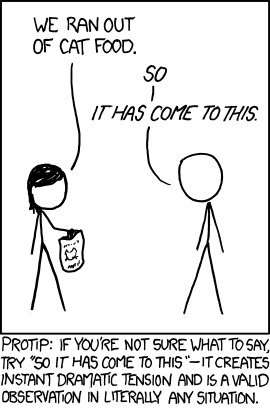Difference between revisions of "1022: So It Has Come To This"
Qoiuoiuoiu (talk | contribs) |
Firestar233 (talk | contribs) m (grammar, etc.) |
||
| Line 8: | Line 8: | ||
==Explanation== | ==Explanation== | ||
| − | The line "it has come to this" is usually seen on the verge of the climactic confrontation between the {{w|villain}} and their arch rival, or when one character has to unleash their utmost ability etc. Despite its dramatic tone, however, the statement is a content-free tautology, true in all possible scenarios in which time progresses in a forward direction. Accordingly, [[Cueball]] is saying it when [[Megan]] tells him that they have run out of cat food, a relatively trivial problem that could be solved with a quick trip to the grocery store. | + | The line "it has come to this" is usually seen on the verge of the climactic confrontation between the {{w|villain}} and their arch rival, or when one character has to unleash their utmost ability, etc. Despite its dramatic tone, however, the statement is a content-free tautology, true in all possible scenarios in which time progresses in a forward direction. Accordingly, [[Cueball]] is saying it when [[Megan]] tells him that they have run out of cat food, a relatively trivial problem that could be solved with a quick trip to the grocery store. |
The title text is a follow-up on the comic dialogue. When Megan replies in confusion, "Come to what?" Cueball then uses another instantly-dramatic phrase that keeps his words ambiguous, only leaving her in the dark. The phrase, "You. Me. This moment." is used when brevity is key, and no information should be leaked to anybody listening. Those conversing then continue the important discussion elsewhere, allowing them to speak more openly. | The title text is a follow-up on the comic dialogue. When Megan replies in confusion, "Come to what?" Cueball then uses another instantly-dramatic phrase that keeps his words ambiguous, only leaving her in the dark. The phrase, "You. Me. This moment." is used when brevity is key, and no information should be leaked to anybody listening. Those conversing then continue the important discussion elsewhere, allowing them to speak more openly. | ||
Revision as of 00:05, 28 October 2023
| So It Has Come To This |
 Title text: 'Come to what?' 'You. Me. This moment.' |
Explanation
The line "it has come to this" is usually seen on the verge of the climactic confrontation between the villain and their arch rival, or when one character has to unleash their utmost ability, etc. Despite its dramatic tone, however, the statement is a content-free tautology, true in all possible scenarios in which time progresses in a forward direction. Accordingly, Cueball is saying it when Megan tells him that they have run out of cat food, a relatively trivial problem that could be solved with a quick trip to the grocery store.
The title text is a follow-up on the comic dialogue. When Megan replies in confusion, "Come to what?" Cueball then uses another instantly-dramatic phrase that keeps his words ambiguous, only leaving her in the dark. The phrase, "You. Me. This moment." is used when brevity is key, and no information should be leaked to anybody listening. Those conversing then continue the important discussion elsewhere, allowing them to speak more openly.
Transcript
- [Megan holds up an open and empty bag with the white silhouette of a cat's face on it. Cueball looks down at the bag.]
- Megan: We ran out of cat food.
- Cueball: So
- Cueball: It has come to this.
- [Caption below the panel:]
- Protip: If you're not sure what to say, try "So it has come to this" – it creates instant dramatic tension and is a valid observation in literally any situation.
Other comics which advocate using catch-all phrases as standard responses for any comment:
- 174: That's What SHE Said
- 1656: It Begins
- 559: No Pun Intended
- 178: Not Really Into Pokemon
- 1215: Insight
- 1627: Woosh
Trivia
The phrase "So it has come to this" is also said in: 225: Open Source.
Discussion
"So, how do we split the bill?" "So, it has come to this."
"Hey, can you take out the trash?" "So, it has come to this."
"Will you marry me?" "So, it has come to this." Davidy22[talk] 13:17, 18 February 2013 (UTC)
This expression is featured in 225: Open Source 85.241.160.83 04:17, 26 March 2013 (UTC)
- Added to the trivia section, but I'm unclear about the copyright policy and if attribution to discussion comments is the norm. Could someone please clear this up? Thanks Z (talk) 02:41, 11 March 2014 (UTC)
"So, it has come to this." "So, it has come to this." Yeah, it also works like this. 46.122.128.93 00:01, 10 October 2013 (UTC)
another universal, drama-creating answer: But will it be enough? 108.162.230.155 16:52, 27 January 2015 (UTC)
I changed what I deemed to be a very wrong explanation for the title text, and I think it was caused because the person did not see the single quotes in the center, closing the dialogue for Megan's reaction, and opening it up for Cueball. On the other hand, it seemed otherwise poorly put together. Feel free to tell me if someone wants to change how I did it, but I am quite confident that the other person had the wrong approach. Znayx (talk) 19:28, 20 March 2016 (UTC)
"The phrase, "You. Me. This moment." is used when brevity is key, and no information should be leaked to anybody listening. Those conversing then continue the important discussion elsewhere, allowing them to speak more openly."
What on earth? I have never heard of this before. This cannot be a thing. ISaveXKCDpapers (talk) 18:15, 21 October 2022 (UTC)
- Agree - and removed. Elektrizikekswerk (talk) 13:18, 27 May 2024 (UTC)
